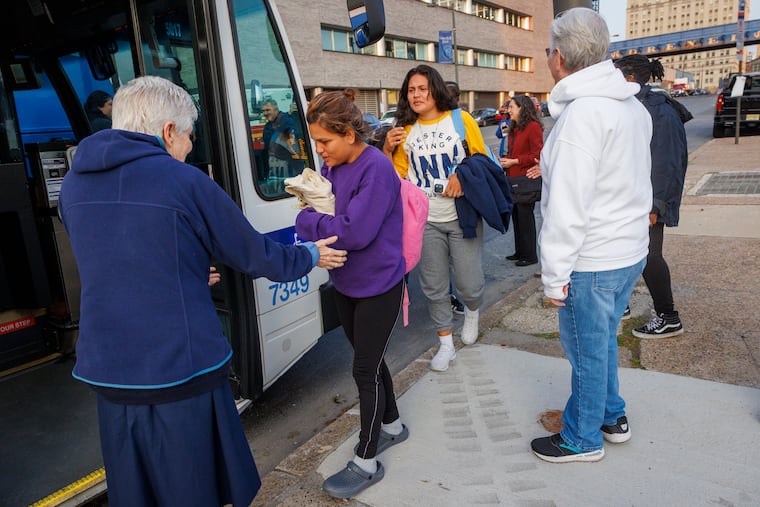As a Catholic priest, I see the change in ‘sensitive’ locations policy as a breach of my faith traditions
Revocation of the "sensitive" locations policy will keep our neighbors from attending funerals, weddings, noon parish Mass — for fear of arrest, separation from family, and deportation.

The Trump administration is changing the understanding of “sensitive” locations — including places of worship — when it comes to immigration. As a Catholic priest in Philadelphia, I am concerned. It is within these places of worship, in the Catholic tradition as well as many other faith traditions, that we hear proclaimed God’s message of love, acceptance, justice, mercy, and accompaniment.
Constant references in sacred Scripture down through the ages have reminded us of our obligations to the stranger, the foreigner, the needy. We need only look to Exodus 25:8, where God tells us of dwelling among us, and 1 Kings 6:11-13, where we hear that he dwells specifically in our places of worship.
» READ MORE: Allowing ICE to arrest people in ‘sensitive locations’ would violate faith traditions and sacred spaces | Opinion
In those places, for Christians, “hospitality” is to be offered to the stranger (Leviticus 19:33-34), love is to be shown to the foreigner (Deuteronomy 10:19), and the hungry and thirsty are to be tended to (Matthew 25:35). Words of acceptance and service to those in need, found in Romans, Ephesians, and Hebrews, remind us of the social doctrines of our faith that are meant to accompany our faith professions.
I think the announced changes, permitting Border Patrol and Immigration and Customs Enforcement agents to enter churches to arrest undocumented immigrants, are initially meant to serve notice that seeking sanctuary in our places of worship will no longer protect someone from arrest for being undocumented and/or entering and remaining in our country without the necessary documents.
But a more extensive use of this by our authorities will keep people from attending funerals, weddings, noon parish Mass — for fear of arrest, separation from family, and deportation. Our church believes we are all God’s children and entitled to the same respect. It becomes painfully evident that those celebrations of our union with God will be shattered when members of our family are taken away in handcuffs.
I fear for families whose mom or dad goes to school to pick up a child at dismissal and then doesn’t come home to their other children. A few years ago, a couple I know from Philadelphia’s Indonesian community left for work, were arrested by ICE, and then separated from their teenage daughters for months. Where they were was a mystery to the children until neighbors helped them finally locate their parents.
When I think of this administration’s plans, I think of the human cost (and courage) of participating in a religious procession, like what happens in Philadelphia on the Feast of Our Lady of Guadalupe, when all the “voices” you hear in society are saying you are illegal.
God never created an illegal person; systems do that. The heartache, fear, confusion, and lack of respect visited on our undocumented brothers and sisters is not God’s plan, and should not be our tool of choice.
For Catholics, in particular, all of this is a far cry from Pope Francis declaring this a “Jubilee Year” of hope, of encouraging us Catholics to be “Pilgrims of Hope,” of opening the door of St. Peter’s Basilica as a gesture of welcome to those seeking God’s love.
We are capable of addressing this immigration challenge, but we are asked to do it as faith-filled people, believing God can and will guide us on the journey — as long as we journey acknowledging that all people, documented and undocumented, are our brothers and sisters.
As a nation, we very possibly have misdiagnosed the “causes” of our immigration dilemma, and as a consequence are misdirecting energies toward houses of worship, schools, hospitals, clinics, etc. — again, our brothers and sisters — instead of painstakingly working on our acknowledged “broken immigration laws” and cluttered legal pathways. That is what is truly fueling the challenge.
For my fellow Catholics, remembering what God teaches us in the “corporal works of mercy” along with the “spiritual works of mercy” will go a long way in ensuring we are truly living our faith.
Msgr. Hugh Joseph Shields is a retired priest of the Archdiocese of Philadelphia. The son of Irish immigrant parents and ordained in 1972, he has served in various parishes in the archdiocese and 13 years in the St. James Society, a missionary group of diocesan priests, primarily in Peru in South America.